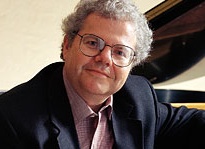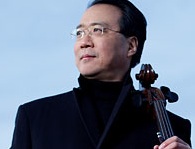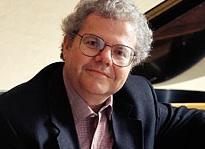
Unfortunately, these compositions were meant to be heard in much more intimate venues, and though Ma and Ax did their best to adapt, the compromises necessary to fill a large concert hall like Davies weren’t always entirely satisfying. While Ax, who is a wonderfully thoughtful musician, played with great restraint, and Ma was as exuberant and charismatic as ever, balance between the instruments often suffered and there was an inevitable lack of immediacy. Worse still, nuances of dynamics, articulation, and tone color, which are so important in subtle chamber music like this, had to be compressed and scaled back.

Superstar performers, like Ma and Ax, who have been playing together since their student days at Juilliard, are sometimes victims of their own success, requiring large-capacity venues to justify the fees that they command. For this performance, which was sold out long in advance, the audience filled even the “chorus” seats behind the stage, precluding the use of the acoustical baffles that are sometimes employed to mitigate the challenges that Davies presents. Although I was sitting in one of the better seats in the orchestra section, I often felt as if I had cotton in my ears, and a friend in one of the box seats complained that the sound was even worse there.
Of Schumann’s three compositions for cello and piano, all composed during spring 1849, two were originally intended for other instruments. The Adagio and Allegro, Op. 70, which opened the program, was actually the first important work to be published for the valve horn. While much of the writing, especially in the Allegro, was designed to take advantage of the strengths of this newly fashionable instrument, in the published score Schumann suggests violin and cello as alternatives, and as a result the piece has long been a staple of cellists’ recital repertoire.
Ma and Ax took a leisurely, gentle, and curiously laid-back approach to the opening Adagio. While I missed some of the darker moods and the sense of longing suggested by Schumann’s characteristically quirky harmonic treatment, the general affect was suave, warm, and inviting, making for an appealing opening to the program. In the Allegro, Ma gave free rein to his naturally exuberant persona, and the result was a lively romp, in which Schumann’s abrupt twists and turns were navigated with a sovereign sense of command. Here too, as in much of the evening’s program, the darker areas of Schumann’s schizophrenic emotional territory received short shrift, and the resulting character was perhaps a bit too pleasant and light.
In the Five Pieces in Folk Style, Op. 102, Ax played straight man to Ma’s mischievous pranks; the “gypsy” fiddling in “Mit Humor” was especially effective. The more serious moments in this work evoke a sense of bathos (it’s easy to imagine Schumann writing with tongue planted firmly in cheek), and there’s a satirical, comical quality that suits Ma’s famously genial personality much better. This music is deceptively simple, though in his caricatures of rustic styles Schumann toys with surprising irregular phrase lengths, even more than he usually does. In addition, there’s lots of effective, though challenging, idiomatic cello writing, including some thorny double-stop passages, all of which Ma tossed off with impressive ease and practically flawless intonation.
All Hail the Mighty Schumann
After the two sets of Schumann miniatures came the premier performance of a substantial new work, Peter Lieberson’s postmodern tribute, Remembering Schumann, commissioned by the S.F. Symphony, in conjunction with the Los Angeles Philharmonic, Carnegie Hall, the Concertgebouw, and the Barbican. Commissions by orchestral institutions such as these tend to result in rather conservative compositions, reflecting the taste of the patrons, musicians, and audiences of the modern symphony orchestra, but while Remembering Schumann is certainly an accessible work, it is also more ambitious and adventurous than most such commissions.Lieberson is clearly not afraid to present challenges to his listeners. He alludes to a few specific motivic fragments, rhythms, and textures as seeds for development, yet the tribute is, for the most part, a more abstract, personal meditation on Schumann’s exploration of contrasting characters and quirky, quicksilver shifts of mood. Ma and Ax were at their best here, and I would welcome an opportunity to hear this work again.
The first half of the program concluded with Chopin’s Introduction and Polonaise brillante, Op. 3, a work composed for an amateur cellist, Prince Radziwill, who was one of Chopin’s most important patrons in Poland. The performance history of the Polonaise presents an interesting challenge to the modern notion of a fixed musical work of art. In the original version, the cello part is quite simple, with the piano getting the lion’s share of the work, but Chopin himself revised the composition for a performance with a professional cellist in Vienna, adding the slow introduction. Ever since, not satisfied with the original’s modest technical demands, cellists have produced countless “editions” of the piece, all of which introduce more virtuosic passagework in the cello part, often by transferring filigree passages from the piano part. I don’t know which of these “editions” Ma was performing from, though his performance was certainly in keeping with this tradition, adding a liberal, yet effective and convincing, dose of virtuosic embellishment.
Another set of miniatures, Schumann’s Fantasiestücke, Op. 73, opened the second half of the program. This work was originally composed for clarinet and piano, but, as with the Adagio and Allegro, Schumann suggests violin or cello as alternatives. Although these pieces can be most effective on the cello, this was the least satisfying performance of the evening, with Ma employing a lugubrious, mannered portato in the cantabile passages, obscuring Schumann’s subtle shaping of melodic lines and interrupting the urgent sense of flow established by the piano.
Chopin’s monumental Cello Sonata in G Minor, Op. 65, rounded out the program. A late work, composed for the virtuoso cellist Auguste Franchomme (a close friend and occasional chamber music partner), the sonata is a long work, challenging for performers and listeners alike. It’s interesting to note that the first movement was omitted from the premier performance, given during Chopin’s last public concert in 1848. Even today, the complete sonata is not as well-known as the other great Romantic cello sonatas, which is a shame because it’s a substantial work that gives the lie to the conventional wisdom that Chopin wasn’t capable of working in large-scale genres.
The wealth of melodic ideas in the first movement unfold in a broad sonata form that Chopin’s contemporaries found too long and drawn out. Still, this can be wonderfully effective concert music, especially when given the kind of passionate and thoughtful performance offered by Ma and Ax, with their careful attention to pacing. The piano part is especially demanding (another reason the piece is seldom programmed), and it was good to find Ax being a more assertive partner in this work. Not surprisingly, the fiery conclusion brought the audience to its feet in a standing ovation. As an encore, the artists offered their transcription of the elegiac slow movement from Brahms D-minor violin sonata, which they played from memory.

